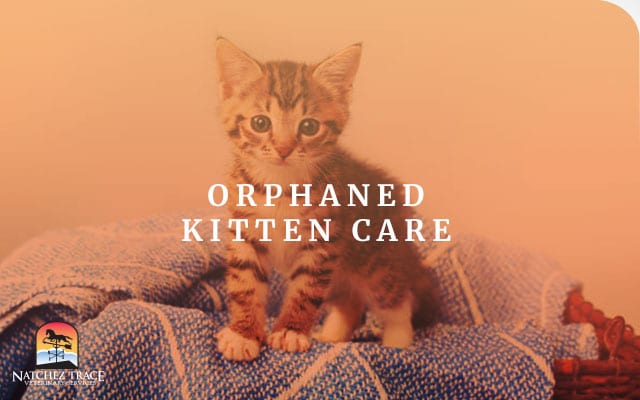IMPORTANT NOTE: Very young kittens rarely cry. Frequent crying indicates a cold, hungry, sick, or pained kitten.
Orphaned Kitten Care: Immediate Care for Newly-Found Kittens
- Check to see if the kitten is chilled or dehydrated. If it is chilled, it’s body will be cool to the touch and it may cry constantly. If it is dehydrated, its mouth and tongue will be dry, and the mucous membranes pale, and its scruff will not spring back quickly when pinched.
- Slowly warm the kitten up using body heat only.
- After the kitten has been warmed up, feed it 5-10% glucose in water. Pedialyte is a good example of glucose in water and can be used at a ratio of 1/2 cc per lb of body weight.
- NOTE: DO NOT FEED THE KITTEN IF IT IS CHILLED. WAIT UNTIL IT WARMS UP. Kittens’ intestines aren’t working properly when they are chilled, and feeding could cause bloating or death.
Orphaned Kitten Care: Keep the Kittens Warm
When caring for orphaned kittens, it is very important to keep them warm. Kittens depend on radiant heat from their mother to stay warm and cannot yet stay warm themselves.
Tips to Keep the Kittens Warm:
- Avoid drafts
- Use a heating pad in a box on low heat. Do not use any setting higher low to avoid the risk of burning the kittens.
- Cover the heating pad with a waterproof material (plastic).
- Line the box with disposable diapers or newspapers.
- The Heating pad should only cover 1/2 of the bottom of the box. Let the rest of the heating pad go upside of the box. This allows the kittens to get off the heating pad if gets too hot.
Ideal Temperatures:
- Birth to 5 Days: 85-90 Degrees
- 5-20 Days: 80 Degrees
- 20-34 Days: 75 Degrees
Orphaned Kitten Care: Nutrition
Newborn kittens need to be fed approximately every three hours. This can be done in a series of six or eight meals equally spaced over a period of 24 hours. Small or weak kittens may need additional feedings. After the first week, the kittens can be fed every six hours.
Warnings
Don’t feed a chilled kitten. If the kitten is chilled its intestines won’t be working properly.
And, feeding at this time can cause severe bloating leading to possible death.
Don’t feed kittens milk or human baby formula. This causes diarrhea and can be lethal.
Listed below are two recipes for emergency kitten formula.
The recipes are safe to use until you are able to purchase a commercial kitten formula. You can get commercial kitten formulas at most pet stores.
Introduce formula changes SLOWLY. Slow changes help ensure the kitten’s digestive system will adapt.
Tips for Feeding
- Feed at 95-100 degrees (body temperature).
- Feed the kitten upright on its stomach.
- Discard reconstituted formula after 24 hours.
- Feed 2-tablespoons/4 oz. body weight. (15% of body wt. Divided into 4-6 meals)
- Feed every 3-4 hours for one week, then every 6 hours.
- Rub rectum and abdomen with cotton moistened with warm water after each feeding to stimulate bowel functions. (Kittens should urinate after each feeding but pass feces less often.)
- Whining or crying USUALLY indicates hunger.
- Test the feeding bottle for the proper flow rate. Do NOT SQUEEZE the bottle.
- Begin feeding in a saucer as soon as the eyes are open. (Usually about two weeks of age.)
- Dip muzzle and tongue in the sauce. Put a finger inside of the mouth to encourage sucking.
- Begin mixing formula with Gerber High Protein Baby Cereal at 3 – 4 weeks of age.
- After one week gradually switch the cereal to high-quality kitten food.
- Slowly begin to substitute water for the puppy formula at four weeks of age.
- Any time diarrhea should develop, dilute the food 50 % with water and call the clinic for instructions.
Orphaned Kitten Care: Sanitation
It is best to use clean newspaper as bedding for the first week. Soft cloth is dangerous for newborn kittens. It can entangle and suffocate them. Don’t use a blanket or soft cloth until the kittens can lift their heads and move around a bit.
- Keep the area clean! This is MOST IMPORTANT for good health!
- Change bedding daily at a minimum to avoid urine burns.
- Rub rectum and abdomen with cotton moistened with warm water after each feeding to stimulate bowel functions.
- DO NOT DISTURB except for feeding and cleaning!
- TWITCHING is NORMAL during sleep. Twitches exercise the muscles to aid growth.
- Bring the kittens to the clinic at four weeks of age for examination and deworming.
- A crying kitten either a COLD kitten or a HUNGRY kitten!
Orphaned Kitten Care: Emergency Milk Replacements
Commercial formula is the best nourishment for kittens, but if you are unable to obtain commercial immediately, are a couple of temporary formulas:
- 1 can of evaporated milk
- 1 can water
- 1 egg yolk
- 1 teaspoon Karo syrup
or
- ½ cup 2% milk
- 1 Egg Yolk
- 1 drop infant vitamins
- 3 Tums® (Tums® is an excellent source of calcium.)
Sources:
- PetEducation.com
- San Jose Animal Care & Services
- White Oak Animal Hospital Archives







